TOM FRANCIS
REGRETS THIS ALREADY
Hello! I'm Tom. I'm a game designer, writer, and programmer on Gunpoint, Heat Signature, and Tactical Breach Wizards. Here's some more info on all the games I've worked on, here are the videos I make on YouTube, and here are two short stories I wrote for the Machine of Death collections.
Theme
By me. Uses Adaptive Images by Matt Wilcox.
Search
Primer

I use Amazon.co.uk’s DVD rental-by-post thing, which is one where you can keep the DVD as long as you like while you’re subscribed. This is good because they can’t have Primer back yet. After watching it, I spent forty minutes reading Wikipedia’s superb dissection of the film’s nine distinct timelines, featuring eleven iterations of the two main characters and a flow chart, then I watched it again with the director’s commentary on. Then I watched it again. Craig raises the objection that something ought to be comprehensible to the human mind on first viewing, and it’s true that this is not. I have a certain amount of time for enjoyably dumb films, but to me this is what entertainment should be: something beyond you, not pandering to you, something that both needs and deserves to be explored and understood.
It’s written by, directed by, produced by, scored by, edited by, partly filmed by and stars a former engineer who’d never written, directed, produced, scored, edited, partly filmed or acted in a film before, for $7,000, with a crew of six and only one trained actor. Its creator’s mum and dad supplied the food. And after watching it, you have to wonder why anyone needs more than that to make a film that doesn’t call for any particular special effects, because none of it really shows. It’s set in real locations which are free and appropriate, mostly with available light which makes it look realistic, and most of the people are people rather than actors, which makes them more convincing because actors don’t act like people anyway. It took two-hundred and fifty-six people and five million dollars to make Memento, a similarly stark and intricate film, and I’m not sure why.
It helps that Primer is about a couple of hi-tech engineers who run a tiny electronics business from their garages on top of their day jobs. In case the thing about timelines earlier didn’t give it away, it’s about time-travel. But it’s unique among time-travel movies in being almost entirely convincing, in about three ways:
1. If time-travel is ever discovered, it will be discovered like this. In Primer it’s a side-effect of a tweaked version of an existing type of machine, and they almost don’t notice it does it. It’s only by chance that one of them stumbles across the fact that the Weeble whose weight they’ve been successfully reducing has accumulated six years’ worth of mildew in its brief time inside. A long and quite slow-moving chunk of the film leads up to this in a very natural way, and the cautious excitement of intelligent nerds making something work is so well-invoked that I found myself quite thrilled when just they got this high-temperature superconductor to work at all, let alone travel through time.
2. This actually makes sense. It effortlessly explains all three usual objections to time-travel scenarios: a) Why haven’t we seen travellers from the future already? The furthest these machines can take you back is to the moment you switched them on. b) Why don’t you appear in empty space when you come out in your destination time, given that your starting point was elsewhere on the Earth’s orbit? You stay physically within these machines as you travel back in time, and you do travel back in time rather than teleport to a specific earlier point: you live backwards in the box while the rest of the world lives forwards. And c) Whatever you do in the past will already have been done in the past, removing the reason for you to have gone back in the first-place. Here, changing the past changes the past of the timeline you’re now in, which is no longer the same as the one you came from. It’s still useful because you can live in this new one, and your self here is planning on getting in a time-travel box which will remove him from it.
3. It’s not glamourous. They don’t whoop and jump around the room when it works. There’s no montage where they win the lottery and get drunk. It’s a hard, weird process to go back: you have to spend as much time as you want to travel inside an argon-flooded coffin, and there are side-effects. These guys try it for six hours a day, make measured profits on the stock market, and carefully isolate themselves from their contemporary dupes.
The plot itself is focussed exclusively on the use of these devices and the relationship between the friends who invented them. There are wives, children, friends and an outside character who plays an enormously important role later on, but none of them get more than a minute of screentime, and we never even find out why the outside character does what he does – simply because the two friends themselves don’t either. That level of focus is essential to detail the incredibly dense web of events that unfold over just a few days of traditional time, and probably only a week or so from the perspective of the most time-travelled character (whose identity would be a huge spoiler at this point).
Just ‘Cause
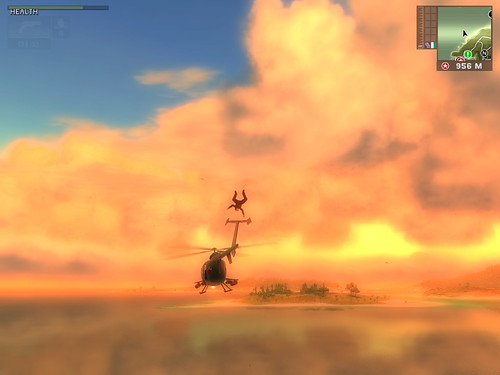
I’ve just declassified my Just Cause shots, since the game is long out. The plot of the game is that the CIA want to overthrow the government of this island nation to destabilise the area and allow them to put their ruler of choice into power. Their modus operandi for this is to drop you, from a plane. They figure you’ll take it from there. You literally do – you control that skydive, and everything from that point on, and you’re basically incredible.
I’m riding a weaponless civilian jet-ski along a winding river with three gunboats following me, three helicopter gunships slamming missiles into the water all around, and the military about to dispatch fighter jets to take me down. I have a grappling hook. And these guys are so, so screwed.
In a minute or two everything is a flaming wreck except the best helicopter, which I am flying, at an altitude of five inches, in pursuit of a police boat that’s arrived to investigate the carnage. I pull up, jump from the cockpit to the boat, and kick the cop out of it as the chopper doubles backwards and crashes upside-down, blades-first into a group of troops lining the coast to get a shot at me, and I zoom off into the open ocean. This is normal for a Tuesday.
Spoiler Test
I’m hoping you can’t read
Not Everything You Find On Flickr Makes A Lot Of Sense Right Away

The Everyone’s Photos page is the best place on the internet.
Posts About Games Writing Suck So I’m Writing A Post About Posts About Games Writing
I’m not partaking of the upsurge of inter-linked So You Want To Be A Games Journalist pieces that the awfulness of this one has caused, I guess because I see its two main offputting features as its self-indulgent subject matter and mind-boggling length. I haven’t read it, will never read it, but in attempting to find the URL for that link I caught myself ingesting a few sentences, and the gag-impulse to vomit a correction or mockery was violent. Despite over-writing pathologically myself, my favourite internet acronym – one I think is an enormously powerful positive force towards better writing – is tl;dr. If I ever feel in a position to lecture you on how to be more like me, please ignore me. And if I feel an article you weren’t going to read anyway demands a parody that is almost as long and requires you to read the tedious original to appreciate, restrain me. But if it occurs to me that a particularly catchy Jeffrey Lewis song is appropriate, please accept it into your hard drive.
The appropriate response to something foul is not to ingest it. If you already have, it is more polite to regurgitate privately, into a bucket.
Supreme Commander
Another trailer of this has just been released, mixing some new game footage with an interview with Chris Taylor. Taylor’s one of those virtuoso game designers: all zeal and vision; and it’s always a pleasure to hear him talk. He has Quentin Tarrantino’s characteristic spluttering urgency in trying to describe all the cool things he wants to tell you about as quickly as he’s thinking of them. I got an absolutely wonderful but almost entirely useless interview with him at a party in Beverly Hills a few weeks before E3, in which he spent around half the time trying to explain the hydraulics of the system by which the leader of the Cybrans – a brain in a jar – could move around his tank of preservative by thought alone. I guess a brain in a jar does everything by thought alone. But it was as hard as ever not to share his enthusiasm.
The other reason you should watch this is that I’m still convinced it’s going to be the best thing ever. Chris says it’s hard to go back to limited-zoom RTS’s after being able to back all the way up to see the full map in SupCom – he’s putting it lightly. I’ve had a headache (manifested in my middle finger) from banging my cranium against that glass ceiling ever since first seeing the game. I’m a particular fan of the long-game, in general – I play out every important phase of DEFCON in real-time, much to the ennui of my opponents, and I’m always straining against the interface of a game to put my plans into action. That’s been most of the challenge of the RTS for a long time – synchronising assaults, tending to the progress of your base and telling it what to build next, exploring the map click-by-click with your forward groups. All three of those things can be defined from moment one here, which is a brave move. What if those were the fun? DEFCON succeeds by doing the opposite – automating less, forcing you be a frontline general by doing everything yourself. But SupCom’s usability enhancements are doing something equally appealing: promoting you. A Supreme Commander cares not for caretaking work. The interface between you and the game world is now a lieutenant in your army: you tell it what you need doing, and it takes care of the particulars. It flatters you somewhat by assuming you have higher things on your mind, grander schemes.
I came late to Total Annihilation, only playing it properly when it was already ancient. What’s almost as striking as its brilliance is how little it has influenced since – the RTS took nothing from its sublime formula, ignored every innovation except its least interesting one: 3D terrain. Playing it now is like uncovering an alien artifact that fell to Earth long ago – you can’t ignore how old it is, but that doesn’t explain how it can be so far in advance of everything we’ve done so far.
A Weak Russian Sunset
It’s Sunday night, but I’m on holiday! I am spared that awful Sunday night feeling, somehow so much worse than Monday morning, when I realise that I actually like my job. I wasted the first two days of my holiday sleeping ten hours a night to recover from my three-week binge of sub-five-hour nights and an inescapable drowning feeling. The only upside of that sorry cycle is that I get the wholly wonderful song Feather By Feather stuck in my head, by the increasingly wonderful Smog, largely thanks to the gallingly wonderful opening verse:
Just trying to wake up,
Half the evening
Just trying to calm down.
The reason I’m telling you of all people this is that losing an irreplacable chunk of the next day – particularly in winter – gives things a weird, sad atmosphere. I’m waking up to weak yellow sunsets, a beautiful but incredibly bleak light that seemed to last all day in Moscow. Hang in there a little longer, we’re approaching the point now. There’s a map in Battlefield 2142 set in Minsk, Belarus, and the sky texture captures this exact sight, light and feel magnificently. I find myself loading it up, alone, and flying a futuristic airlift craft to the top of a skyscraper to get out and admire the view. It’s built for forty-eight players, but the testers have stopped playing so there are no multiplayer games going on. Not that I’d want gunfire spoiling the mood.
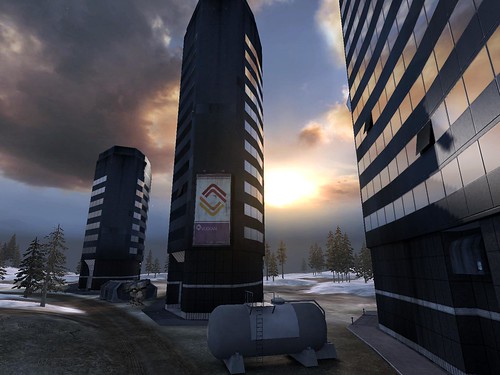
By divine coincidence I only just this week realised how much I like Two Dots On A Map by the Russian Futurists, another gem from the Fluxblog mines. Not only does it have ‘Russian’ in the band name, but it’s also magnificent, majestic, sweeping and unbearably sad. I don’t know what the backing vocals are saying, but the last lines are:
Is this how we’d leave things?
I choose to hear “If we knew we were” as implying that we are, but aren’t facing it. Which is true, and awful.
I actually thought this mopey wistfulness might be a sign of age, but I just now found a text file on my hard drive describing exactly the same thing, written by me in 2002. So I’m just repeating myself, which is worse.
So… I think I was trying to lead in to the subject of game-music associations, which are brilliant. My favourites:
Half-Life 2 and The Great Destroyer, by Low: two of the best things about planet Earth released at the same time – it was a good November. To this day I’ve never actually listened to Low while playing Half-Life 2, because I like Half-Life 2’s in-game music, but I alternated between the two so reliably that the connection forged nonetheless, and now I can’t stop at those weathered, deserted seaside shacks overlooking the glassy sargasso without hearing the exultant Walk Into The Sea, nor whack that childless dangling tyre with a crowbar and not hum a few bars of California. This is another sad one, isn’t it?
System Shock 2 and Cobra And Phases Groop Play Voltage In The Milky Night, by Stereolab: ba-ba b’dow b’dah. Bubbly futuristic electro-pop played over paranoid dystopian futuristic action RPG. I subconsciously reconciled the two by identifying this album’s off-kilter jauntiness with the hollow optimisim of Xerxes’ pre-recorded broadcasts to the long-dead crew of the Von Braun. Good save, subconscious!
Deus Ex and Voodoo Wop, by Clinic: itchy stompy scary medical drone punk played over a nocturnal interactive conspiracy theory? Well, they’re both uneasy, inaccessible and dark.
Hitman: Blood Money and Deep Cuts, by The Knife: sheer coincidence, I assure you, that I got into these at the same time and that the last screenshot I posted of Hitman was of cutting someone deeply with a knife. There’s no connection between music and game beyond the violent overtones – The Knife aren’t even that sinister, a lot of the songs are upbeat or simmeringly sexy.

Yeah, so they’re a little sinister.
Event-Inspired Idea: Cellphone Breathalizer
My first post to a long-time favourite site, the Halfbakery:
Build a breathalizer into the mic section of a cell-phone, and have it measure the alcohol content of your breath as you start to speak, or breathe into it while waiting to be connected. If it detects mild levels of intoxication, it mutes the mic for a second and plays a pre-recorded message to the recipient of your call to the effect of:
“I’m sorry, but the caller you are talking to is inebriated. Please disregard anything they may say.”
If it detects extreme levels of intoxication, it disconnects you, dials a taxi firm, retrieves your location from a GPS component, relates it to a street via the Google Maps API, then text-to-speeches that info into a pre-recorded message to the effect of:
“I would like a taxi from [place name] to [home address]… yes, it’s [surname]”
So far four people have found the idea croissant-worthy, while two have inexplicably deigned to fishbone it. Weak.
I Am About To Play One Of These Games

Battlefield 2142 Demo: Yes, I have the full version, and yes, thank you for noticing, I am the very model of a futuristic Major General, with forty unlocks to his name and medals alphabetical (G&S FTW, S60 FTLOL). But they’ve shut down the review servers now, and so I must play with the great unwashed on the terribly unreliable demo servers. Often, the great unwashed shoot me repeatedly in the face, inexplicably disregarding my rank.
Still, I have been mostly holding my own. Battlefield is only fun when you have some success, and one morning this week I destroyed three Titans, got two gold and one silver medal and cut four soldiers’ dog-tags before breakfast. That is the start to a good day. 2142 is also a great way to stay up – win or lose, the sheer concentration of adrenaline in my system from this game makes fatigue seem a distant and absurd concept. Sometimes that adrenaline is causing me to break my mouse in frustration, or splutter in an unmanly high-pitched voice at the injustice of it all. Counter-intuitively this is not the sign of a bad game – it comes up a lot when I’m playing a bad game, but watch closely for the moment shortly after, when it happens again and I just sigh irritatedly. That’s the sign of a bad game. In Battlefield 2 and 2142, my searing, spastic, apoplectic rage never subsides. I always care because I always believe in it, and it’s always “FUCK!” instead of “Oh fuck it then.” That, as N fans will attest, is the sign of a good game.
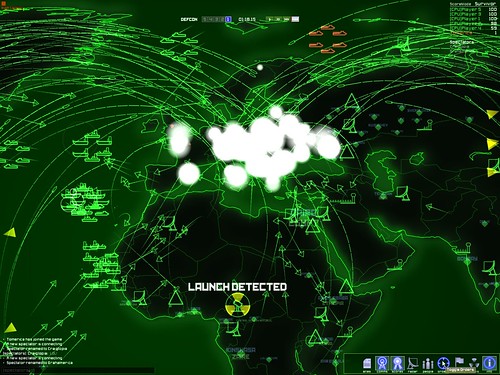
DEFCON: It’s out! It’s selling! People love it! I cruelly ignore this when reviewing their games, but I have an enormous fondness for Introversion. It’s mainly because of Darwinia. People would sometimes ask me, of that, “Yeah, but is it really good, or do you just like it because it’s indie?” It is really good. It’s one of the ten best games ever made. It’s special in some ways that even Half-Life 2, Deus Ex, and Oblivion are not – it has a coherence of vision, a richness of imagination, a warmth of some kind it’s hard to articulate. Those aren’t the most important things about a game, or it would be better than The Big Three, but it has these things which they do not. More than anything, it couldn’t have been made by anyone else. So I am pleased that everyone is finding DEFCON as much fun as I did, and that they are obeying the Must Buy award I gave it. Even if I am sort of hoping they make something more like Darwinia next.
Until quite recently I was quite good at DEFCON. My first public game with five strangers went appallingly, and I’d just decided I’d been rubbish all along when I noticed that it was fifteen minutes past the end of my lunchbreak and I had won by a staggering margin. Then I tried Diplomacy. In Diplomacy, all the nations of the world start in the same alliance, and the action only starts when one betrays it, or the rest vote to kick him out. I am not good at Diplomacy. I should play the regular mode again now to see if coming dead-last as the strongest territory in the game has ruined my confidence to the extent that my early-game bravado will lack the conviction it needs to convince the other players that I’m an idiot and don’t need to be attacked because I’ve probably spent all my nukes anyway and surely won’t NUKE YOU HARD IN THE CAPITOL the second your silos hit launch mode.
Company Of Heroes: I know, rationally, that this will be very good. I have it right here. It got 94%. I love Relic, I think Dawn Of War is my favourite RTS. And yet that little silver quicklaunch icon never gets any more tempting. I’ve even played enough of Company – at a press event in Hollywood and on this very machine for a few minutes one morning (morning gaming is a habit) – to know that I love it. But oh God, do I really want to go back to World War II? I’ve fought every miserable minute of that wretched struggle from every conceivable angle, and I want to forget it almost as badly as the people who lived through it. This isn’t ennui, it’s shellshock. If I put Company off long enough, maybe they’ll make Dawn Of War 2 with all the stuff that makes it great? I’ve heard it’s similar to Dawn, but to me they couldn’t be more different: one is set in the most exciting universe the human mind has ever dreamed up, the other is set in the most miserable time and place in human history.
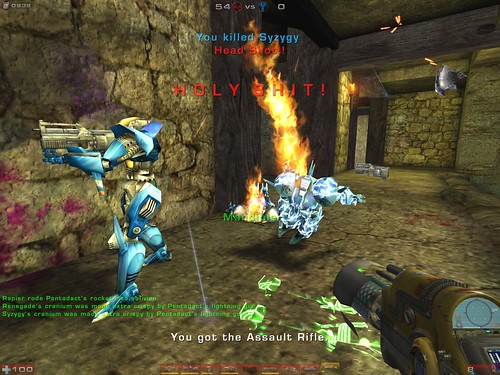
UT2004: I suddenly realised why Half-Life 2 Deathmatch was the only multiplayer game I did well in. I liked it. So I played it. You actually improve at something if you do it a lot. So I went back to the other one I liked, UT2004, and played that a lot. And lo! I could beat Adept bots. In fact, I started doing the thing you often see arch villains do: have my minions attack me in absurdly unfair fights, me outnumbered sixteen to one, and see if – okay, to show them – I could take them all on. If you add in the Bullet Time and Ninja Rope mutators, you can crank up the odds to even more absurd levels, and be even more awesome. I call this mode Arch-Villain Arena, and the ability to mess with UT to create things like this is one of the reasons I love it so much. There’s a common mathematical misconception that less is more – I’ve done two modules in advanced number theory, and I can tell you first hand that more is much more than less. In fact, if you research the etymology of the word to the extent that I have, you find that its roots are closely tied to those of ‘more’ itself.
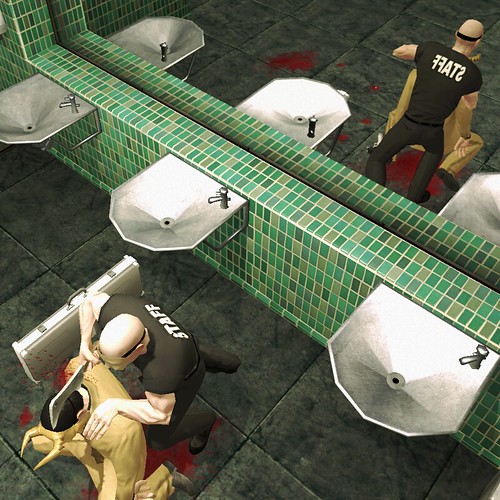
Hitman: Blood Money: I almost feel I’ve talked enough about this, but I’ll just say that the scope for macabre finesse in this game is narcotic.
So: Which? I was hoping writing briefly about all the amazing games on offer right now would somehow clarify the most appealing option, but I still have no idea. Maybe I’ll just watch TV.
Dexter

Plenty of awesome things starting on US TV at the moment, and plenty of awesome things returning, so I missed that an intriguing show I read about in the paper months back had started – until Graham supplied the pilot. Played by best-thing-about Six Feet Under Michael Hall, Dexter’s a sociopathic compulsive serial killer with a day job as a forensic analyst for the Miami police, specialising in blood-splatters. And killing murderers. It’s not about him taking out the guys the police can’t prove their case against, it’s about him desperately needing to sate his bloodlust and deciding to at least restrict himself to the more deserving victims. And it is, of course, superb.
Dexter fakes normal, happy life with aplomb, making the atmosphere absurdly sunny and upbeat. His boss fancies him, his sister depends on him, and he has a doting rape-victim girlfriend he dates because neither of them are interested in sex. Forensic science is a world in which everyone has to be ghoulishly indifferent to murder just to get through the day, joking about corpses over donuts, so Dexter’s bona fide ghoulishness blends in seamlessly. Only one cop thinks Dexter’s a sick freak barely attempting to hide it, and loathes him violently and openly. Dexter is relentlessly nice in response, and inwardly slightly saddened that only one person seems to have noticed.
The joke, of course, is that Dexter has a superb insight into the workings of a serial killer’s mind, and has to actively try not to catch them in his official capacity in order to keep himself in potential victims. In the pilot, he comes across an ongoing case in which all victims are found neatly dismembered and entirely drained of blood, a style Dexter admires so breathlessly that he has trouble maintaining a professional veneer when he first sees the body – “Why didn’t I think of that?”. His usual distaste for the killers he kills is completely eclipsed by his awe at this man’s style, and the two of them are starting to become fixated with one another – the killer stalking Dexter in the most chilling way, which Dexter takes as a friendly hello.
Really the remarkable thing about him is not that he’s a serial killer, it’s that he’s a well-written sociopath. Like Highsmith’s Ripley he fakes his civilised persona so well that even you are won over by it, and like Ellroy’s Terror his compulsion is so compellingly depicted that you empathise with it almost as much as Monk’s OCD. It proves that a protagonist can be sympathetic irrespective of his crimes if his personality is appealing enough, and you couldn’t ask for a more delicious twist on the traditional ace-detective archetype.

The comments hereafter may be spoilerific for anyone not up to date with the latest episode aired in the States.
Bad News
For some reason the gaming news media have attempted to evolve from scratch, rather than taking any cues from the way actual news is reported. Stranger, the natural-selection process for which sites become popular seems to be horribly, horribly broken. Thanks partly to RSS and partly to free-and-easy link-without-reading incest, the headline has become the only important thing about a story. There’s a huge chunk of readers, myself included, who click links to news stories without knowing which site they’re going to until they get there. For that reason, the site’s reputation and integrity is irrelevant – all you know before clicking is the name of the story, and the more outlandish and unlikely it is the more you want to see how they justify saying something so patently untrue.
It’s getting pretty ridiculous. Right now, the most-clicked news story in the most-read game news aggregator, which pulls together the content of 186 news sites, is called “Rumor: WiiD Coming Next Year?” It’s a piece on Kotaku decrying this image as fake, since it clearly looks like a DVD player and Nintendo have announced the Wii won’t have one:

“The lesson here,” chides Brian Crecente, “is to check your rumors before you start creating fake images to pass around.”
Is it… is it a DVD player that straps to your face, Brian? Do you push the DVDs into your eyes to watch them? Is Wii-D a phononym for DVD that just misses out a letter or two? Because that thing, fake as it is, is quite openly a 3D stereoscopic headset. It would be bizarre enough if you were just picking headlines in order to state that they weren’t true in the body copy, but even the fake image you’ve posted isn’t suggesting the claim in your headline. You’ve just made something up, then insulted it, then reported it as a rumour, and backed it up with a forged image that you haven’t even looked at. A rumour is called a ‘false rumour’ if you know it isn’t true, and if you yourself made it up, the word for that is ‘lying’. That could be a useful new prefix for a lot of your stories, actually. And it probably wouldn’t stop people clicking on them.
I’m sure there was a time when Kotaku was the only offender. At time of writing the latest story on Joystiq is “Ridiculous “black 360″ with ridiculously cute cat”:

It’s the reporter’s cat. Could this be the best story since they broke the news that if one number is bigger than the other, then the smaller number is smaller than the larger one, all else being equal? The story here, again, is that their own headline is inaccurate, this is not a black X-Box 360 retail unit.
“This “black 360″ crap is really getting silly. That’s a test kit that my cute-ass cat is pwning. Nothing more.” Great. What am I doing here again?
At least Joystiq have the decency to be exasperated by their own mendacity, I suppose. To be fair, they do link another photo of the same type of unit posted on cousin-site Engadget, ruthlessly exposing the truth behind the lie! Except that the Engadget post they’re talking about, which they don’t link (but do hotlink the image from), is also one explaining that the image is really of a test kit.
“Can we move on now?” the writer sighs. Let’s see: you first posted this story on June the 11th, 2005. The outlook isn’t good.
That’s the other mind-numbing thing about gaming news: the zeitgeist is amnesiac. A major story becomes a major story again three months later, when everyone forgets that it ever happened. Again just using today as an example, and I apologise to Tom because this is not his fault, Eurogamer have the news that there will be X-Box 360 exclusive episodes for GTA IV. At least this story is true. I know because I was at the Microsoft pre-E3 conference when they announced it in May. I also know because I read it on Eurogamer the next day.
24: Drink When…
- Someone annoying is kidnapped.
- A terrorist informs another terrorist that “Everything is proceeding as planned.”
- A terrorist assumes Jack is dead.
- The person in charge of CTU makes a bad call.
- Jack goes rogue.
- Jack is fired.
- Jack is arrested.
- Jack breaks out of CTU.
- Jack is reinstated to CTU.
- “Protocol.”
- Someone gives a hopelessly vague order (“Take precautions.” “Make something happen.”)
- Someone gives a redundant order (“Proceed as planned.” “Execute the next stage.”)
- The president screws up a common phrase (“Keep me closely posted.” “We’ll cross that bridge when the situation presents itself.”)
- Someone at CTU has to go behind their boss’s back to help Jack.
- “We don’t have time!”
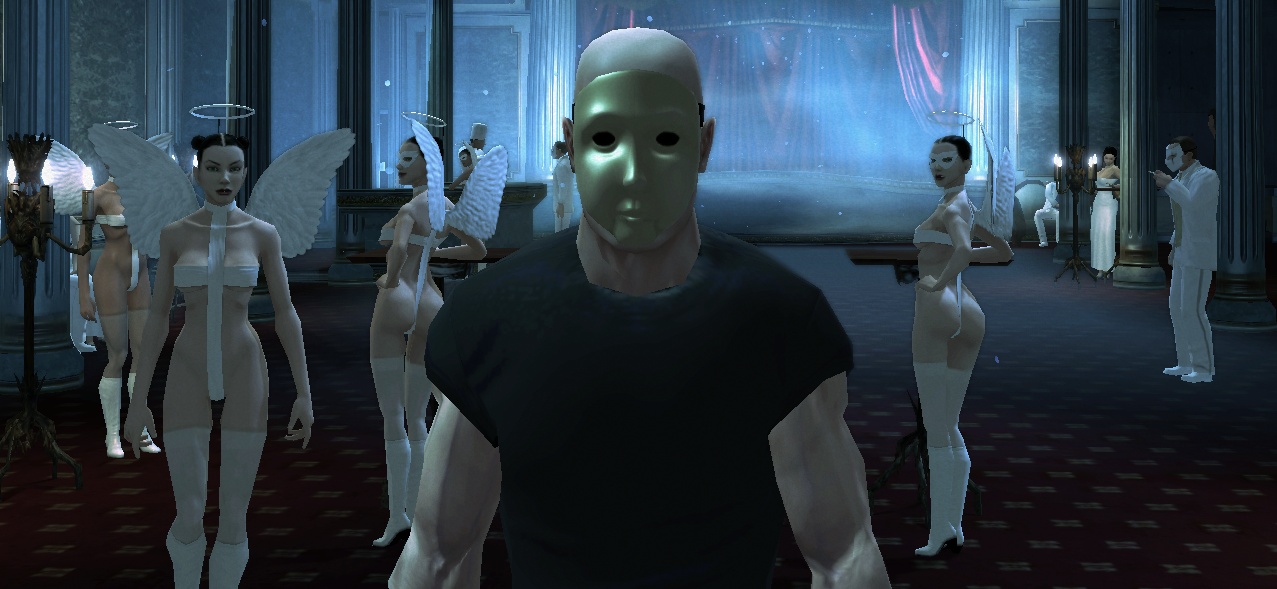
Blood Money And Sex
Update 2016-03-01: Since this post still comes up occasionally, I’ve edited it to be a bit less dickish.
The women in Hitman: Blood Money are grotesquely over-sexualised, which is not unusual for a videogame, but I think the reason for it might be. Blood Money’s vision of the world is stylised to let us see it through the eyes of the hitman: a sociopathic clone completely disconnected from human nature. To make someone see the world the way your character does, make the world the way the character sees it. Continued
Veronica Mars
I’ve been meaning to write properly about why Veronica Mars is so awesome at some point before it kicks off again on the third of October, but for now I’m just messing around with clips. This is my first embed, so wish me luck. It’s one of my favourite moments from the second series:
Too Zune
My MP3 player has finally, inevitably broken beyond repair. It’s stuck on record, it won’t stop recording everything, so it’s just what you want lying around the White House Counsel’s office. And in an odd twist, Apple’s recent MP3-player announcements were more appealing than Microsoft’s. I say odd because Microsoft and Apple are sort of like Churchill and Hitler to me: I wouldn’t want to hang out with either of them, but there’s “not nice” and then there’s the holocaust. I could never buy either, but I really like that Apple have made each of their models dramatically better in at least three ways each, and reduced the price. I always like it when a company goes further than strictly necessary to maximise sales.

Microsoft’s MP3 player, apart from looking like a seventies TV set (update! Or a complicated biscuit, as Tom puts it), is a festering hive of digital rights-management restrictions. It has the cool-sounding ability to wirelessly share tracks with other Zunes (sans PC), but restricts the sharee to three listens of the track before it’s deleted. To do that, it actually infects your music with its DRM chastity belt, even if it’s an MP3 you recorded your damn self. Having grown up with computers, I’m afraid I’m one of these techno-hippies who regard data as sacred. It seems fine to me to offer services like iTunes where you buy music with restrictions built in, but my stuff is sacrosanct. Your seventies TV has no idea what it is, where it came from and what I’m entitled to do with it.

So I somehow found room to be offended by that even though I didn’t want the feature and knew I wouldn’t buy one anyway. The core reason I can’t use a Zune or iPod is that both insist on their own evil infection of your machine. iTunes is the reason I don’t flinch when comparing Apple’s products to the holocaust. The Zune, like anything that wants to support Microsoft’s DRM stuff, uses the Media Transfer Protocol to talk to your PC. That means it isn’t a storage device you’re free to use as you please; everything you transfer to it has to go through Windows Media Player 10. This is disastrously unreliable, slow and restrictive. MTP will actually stop you from copying a file type that Windows Media Player doesn’t recognise to your player, even if the player itself specifically supports it. MTP devices show up in Explorer, and are mocked up to look like storage drives, but you’re restricted to the default view, your right-click options are taken away, and you can’t open files directly from the device. Explorer is about the only part of Windows that still almost works intuitively, though XP tried its level best to obfuscate it and mollycoddle new users into misunderstanding their system, and they’ve specifically crippled it to be less logical and usable with respect to MP3 players. I will enjoy watching you fail, Microsoft, even if it is to a greater evil.
Some brands pointedly boycott MTP, or at least pointedly include a UMS option – USB Mass Storage, an older protocol from the days when things were built to work rather than monitor and defy you. Sandisk’s Sansa players have had an aggressively anti-iPod campaign, and bragged about their ‘just works’ driverless storage device functionality, but they do lose marks for also supporting MTP as an alternate mode (“I’m clean, but also support herpes as an alternate mode”) and only supporting video in Quicktime format. Their contempt for Apple’s proprietry restrictiveness would ring truer if they hadn’t co-opted Apple’s own grossly inefficient, poor-quality, bloated, slow and disgusting QuickTime format. More admirably but more cumbersomely, bovine-sounding Cowon make UMS-only players, proudly support OGG (an open-source music format, more efficient than MP3), and have a ridiculous 35-hour battery life on their larger model. My favourite musical gadget site Anything But iPod specialise in alternatives, and are good about specifying MTP or UMS in their reviews. My hope is that Microsoft having their own player to pimp will mean they stop putting pressure on once-cool companies like iRiver and Creative to cripple their players with MSDRM-friendly FFS-inducing MTP, and that Anything But Zune launches soon.